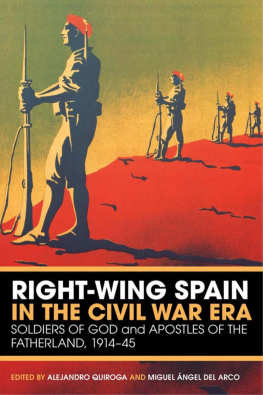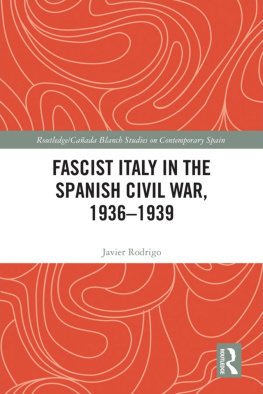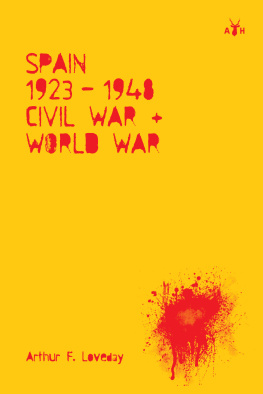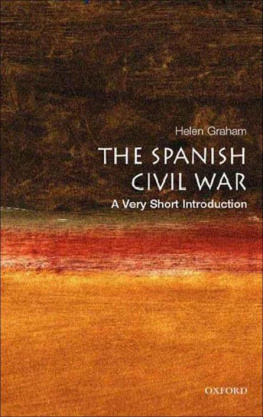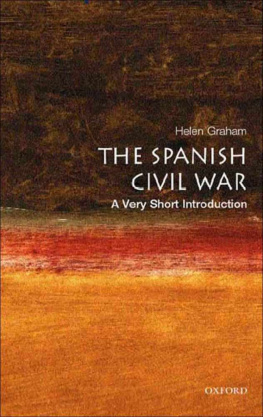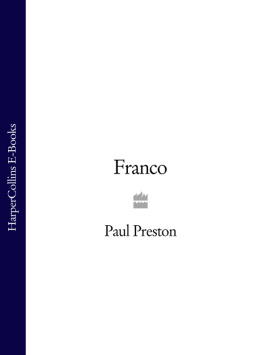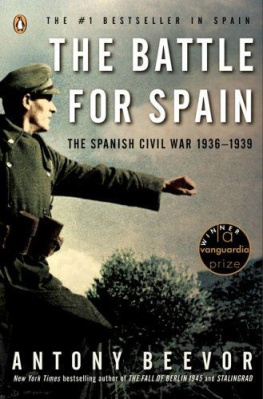Right-Wing Spain in the Civil War Era
Soldiers of God and Apostles of the Fatherland, 191445
Edited by
Alejandro Quiroga and Miguel ngel del Arco
Continuum International Publishing Group |
The Tower Building 11 York Road London SE1 7NX | 80 Maiden Lane Suite 704 New York NY 10038 |
www.continuumbooks.com
Alejandro Quiroga, Miguel ngel del Arco and the Contributors, 2012
All rights reserved. No part of this publication may be reproduced or transmitted in any form or by any means, electronic or mechanical, including photocopying, recording or any information storage or retrieval system, without prior permission from the publishers.
First published 2012
Chapters 1, 2, 3, 5, 6, 7 and 8 were originally published in Spanish by Comares in Soldados de Dios y Apstoles de la Patria , Granada, 2010
British Library Cataloguing-in-Publication Data
A catalogue record for this book is available from the British Library.
ISBN: 978-1-4411-8326-2
Library of Congress Cataloging-in-Publication Data
A catalog record for this book is available from the Library of Congress.
Typeset by Fakenham Prepress Solutions, Fakenham, Norfolk NR21 8NN
T his book is concerned with the leading figures of the Spanish right in the turbulent period 191445. By adopting a biographical approach, the volume aims at providing a new insight into the origins, development and aftermath of the Spanish Civil War. The focus here is on how key individuals experienced the political and social crises of interwar Europe. The books main arguments can be encapsulated in two key propositions. The first is that the Spanish conservatives, far from being an isolated, monolithic block, were a heterogeneous force profoundly influenced by German Nazism, Italian Fascism and French Traditionalism. The second is that the interaction of Spanish nationalism and Catholicism was the ideological driving force at the heart of the rights political cultures and actions. If we are to understand the radical solutions that the conservatives chose to halt the threats that they saw in a rapidly-changing, post-First World War society, then we have to explore the rights religious perception of the Spanish nation and its patriotic concept of Catholicism. In doing so, the book also challenges the idea that Catholicism hampered the consolidation of fascism in Spain.
The chronological framework of this work is delimitated by the two world wars. Between 1914 and 1945, Europe experienced revolutions, the collapse of empires, ethnic cleansings, unprecedented social struggles, and the rise of fascist regimes and genocides. These cataclysmic events can be understood as part of a European Civil War that brought into conflict forces of the right and the left throughout the Old Continent. On many occasions this European Civil War was a cold war with low levels of physical confrontation. It was a domestic struggle that took the shape of strikes, lockouts and skirmishes between trade unionists, on the one hand, and policemen, military men and members of right-wing gangs, on the other. In other instances, however, the European Civil War turned into one that was far from cold. The civil wars in Finland (1918), Russia (191722) and Greece (19445), together with the myriad infightings all over the continent under Nazi occupation, are good examples of hot conflicts in which the domestic socio-political clashes were directly influenced by international disputes and vice versa. Within this wider picture, the Spanish Civil War of 19369 has to be considered a central episode of the European Civil War.
It was in this context of European Civil War that the Spanish rights ideas, social anxieties and political decisions were shaped. The mental universe of the characters analysed in this volume was forged in a context of continuous struggles among Europeans, and the ideas and fears that led to the political mobilization of the Spanish right were heavily influenced by thinkers, politicians and events beyond the Iberian Peninsula. Thus, Antonio Maura, the leader of the new right in the last years of the Restoration regime (18751923) was a good friend of the French traditionalist chief Charles Maurras and understood the need of modernizing Spanish conservatism following the dramatic changes brought by the Great War. General Miguel Primo de Rivera befriended Marshall Petain and was always very fond of paralleling his dictatorship (192330) to that of Benito Mussolini. Like his father, Jos Antonio Primo de Rivera was a great admirer of Mussolini, and his Spanish fascist party Falange drew heavily from the Italian radical right. Jos Mara Gil Robles, the leader of the Catholic right during the Second Republic (19316), travelled to Nuremberg to learn first-hand from the Nazis how to organize parades, rituals and propaganda. Juan Tusquets, Francos daughters private tutor and one of the nationalists key propagandists, visited the Nazi concentration camp of Dachau. Juan Antonio Suanzes, Francos minister of Industry and Trade, took fascist Italy as the model to follow when implementing his project of national modernization. Antonio Vallejo Ngera, head of the Psychiatric Services of the Francoist army, learnt some of his methods in Germany before developing a programme of experimentation on Republican prisoners. Even Francisco Franco, a man seldom inclined to intellectual activities, was an avid reader in the 1920s of the anti-communist propaganda generated by the Entente Internationale contre la Troisimme Internationale , an anti-Bolshevik organization founded by White Russians and Swiss reactionaries. More important in terms of international influence was, of course, the fact that Francos rise to power within the rebel ranks and, ultimately, his military victory in the civil war, were mainly due to the aid of Hitler and Mussolini.
In most of the literature about the 1920s and 1930s Spanish right there is little place for individuals. The former wave of interpretation underlines the fluent relations between Spanish and European radical conservatives; the latter school relies on a rigid concept of fascism and argues that Francoism was never a genuinely fascist regime.
By employing a biographical approach, this volume aims at shedding some new light on the subject. Beyond the broad purpose of ascribing substantial ideas to protagonists through biographical narrative, the analysis of the lives of these leading right-wingers allows us to historicize the Spanish right in a more comprehensive manner. Instead of studying a figure or a movement confined to a particular political regime, we explore the lives of our protagonists in the interwar period. This chronological framework allows us to follow the lives of these historical subjects over the last years of Restoration, the Dictatorship of Primo de Rivera, the Second Republic, the Civil War and the early years of the Franco dictatorship. The goal here is to overcome the traditional chronological structures linked to political regimes. In this manner, we are able to focus on the way diverse social and political transformations impacted on our characters throughout different historical periods. Rather than a motionless picture of historical subjects, we provide the reader with a film in which the lives of the principal protagonists go through different political eras.
As Ian Kershaw reflected when writing on Adolf Hitler, biographical analysis can easily fall into the trap of over-personalizing complex historical developments [and] playing down the social and political context in which the actions of the protagonist took place. How did they see a given political system? How did they come to a particular idea? Why did they choose to take a certain decision? What triggered a precise action? All these are very specific questions that need to be answered taking into consideration the historical context in which the actions of the individuals took place. This biographical approach does not minimize the importance of social and political context but restores a sense of human agency in the interpretation of the past.

